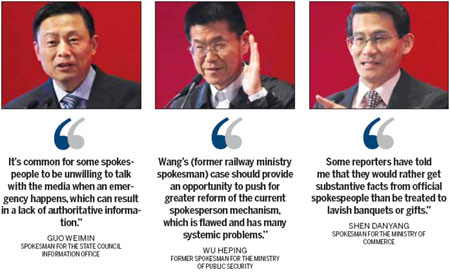Inappropriate comments
Mention of China's spokesman system usually prompts the name Wang Yongping. He was the spokesman for the former Ministry of Railways in July 2011, at the time of a deadly high-speed rail crash in Wenzhou, Zhejiang province, when a train ploughed into the back of a stationary express, causing multiple deaths and injuries.
Wang was dismissed from his post after a series of gaffes: When reporters challenged his explanation of why a rail carriage that had been buried just one day after the crash, Wang told them, "Whether you believe it or not, I believe it", and when 2-year-old Xiang Weiyi was pulled alive from one of the train's cars shortly before it was to be buried, Wang described the event as "a miracle".
Although his comments prompted public outrage, some insiders expressed sympathy for Wang, saying that he didn't have enough information when he was ordered to face the media.

"Wang's case should provide an opportunity to push for greater reform of the current spokesperson mechanism, which is flawed and has many systemic problems," said Wu Heping, a former spokesman for the Ministry of Public Security.
In many government agencies, spokespeople have no access to key information because their official rank is too low, according to Wu. Because few government bodies have departments to analyze public opinion, many ministries and commissions are unable to respond effectively to public criticism and questions, he added.
Lyu Dapeng, spokesman for China Petrochemical Corporation, also known as Sinopec, said he was told to "watch out for fire, theft and reporters" when he was appointed as spokesman for the leading oil producer last year.
"The paucity of information released resulted in Sinopec gaining the image of an arrogant, low-efficiency, self-perpetuating entity that accumulates wealth through its monopoly status," Lyu told the forum.
Of the original batch of 75 spokespeople unveiled by the ministries and commissions in 2004, approximately 30 of them have gained promotion, including some who have never attended a news conference, according to a recent report in Beijing News.
Wang Xuming, a former spokesman for the Ministry of Education, said promoting spokespeople who always remain silent or talk in "correct cliches" is unfair.
Guo at the State Council Information Office said, "It's common for some spokespeople to be unwilling to talk with the media when an emergency happens, which can result in a lack of authoritative information."
Even though all the ministries and commissions have embraced the spokesperson' mechanism, many of those appointed have failed to release regular, timely information. The State Council Information Office is currently working on plans to urge government bodies to set up a mechanism to ensure the regular release of news, he added.
Cheng called for a new law to promote the release of government information. Under the existing mechanism, there are no measures to force government departments to issue news releases, and the timing of a release is usually decided by the top government officials rather than in accordance with the law, she said.
The State Council Information Office should provide more training for spokespeople and also high-ranking officials, she said. "The best way to ensure social stability is to let the truth run ahead of the rumors."
Contact the writers at sunshangwu@chinadaily.com.cn and anbaijie@chinadaily.com.cn
|
|
|
|
|
|
|
|
